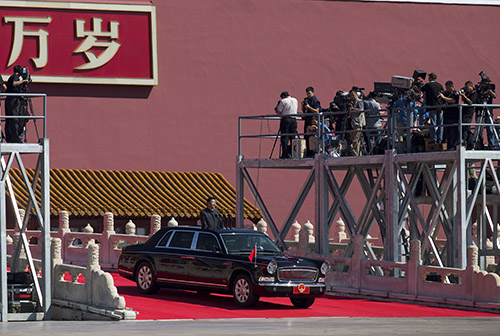The day after a lavish military parade was held in Beijing on September 3 to mark the 70th anniversary of the end of World War II and China’s role in defeating Japan, three major Chinese newspapers–Southern Weekend, Southern Metropolis, and Southern Daily–published pages of photographs and articles brimming with nationalist sentiment. The papers all belong to the Southern Media Group, often called the Southern Series, a state-owned media conglomerate based in Guangdong province. “The Southern Series has opened a new chapter walking on the correct road and developing fast,” wrote Xinhua, China’s state press agency, in praise of the newspapers’ coverage.
Yet for journalists working at the Southern Series, once known for its liberal-leaning political stance and investigative reporting, this “correct road” is not a positive sign for press freedom.
A reporter who has worked for Southern Metropolis for nearly a decade, and who asked not to be named for fear of reprisal, told CPJ, “After the September 4 issue, a friend who once worked for us, said to me, ‘this pledging of loyalty to the Communist Party is an act of self-humiliation. It killed the last bit of expectation and good impression the public has for the Southern Series.”
The Southern Metropolis reporter showed CPJ articles the news group published several years ago, and said: “There is absolutely no way you can publish such articles today.” One headline read: “The government should relax its control over the media,” and another read: “Journalists, please maintain the ethics of being independent observers.”
The Southern Series have suffered under a string of government crackdowns in recent years. In April the government revoked the license for one of its newspapers, Money Week, and last September, Shen Hao, president for the 21st Century Media Syndicate, which is part of the Southern Media Group, was detained on extortion charges, according to reports. The most recent blow came on August 26 2015, when a Guangdong government website published a report that outlined the government’s stringent censorship requirements. In the report, the government ordered the media group to increase the percentage of staff who are Communist Party members and to strengthen the “ideological education” of its journalists and editors.
“We are certainly not happy with the report [on censorship requirements] but no one is really surprised,” said another reporter, who works for one of the Southern Series newspapers and who also asked not to be identified.
The reporter for Southern Metropolis told CPJ that on September 7 the news group issued a confidentiality agreement that all employees are required to sign. “In the agreement, there are 27 articles. For example, No. 7, ‘Do not send information related to national security and sensitive internal affairs through your instant messaging apps, WeChat, Weibo, BBS and other online communication tools.’ And No. 23, ‘Do not use cellphones given by foreigners or foreign organizations,’ ” the reporter said. “This agreement can give the group carte blanche to rid those who ignore prevailing political sensitivities.”
The daily censorship of newspapers in China is carried out mainly in two ways: censorship orders sent directly from the government, and through an internal censorship department. Both journalists with whom CPJ spoke said that government directives arrive so quickly and frequently that it leaves the internal censorship personnel with little work to do. Orders to not write about something come before journalists even start to write.
The Southern Series was once one of the most financially successful commercial media companies in China. However, according to an annual report on the Chinese media industry published by Tsinghua University and the Chinese Academy of Social Sciences, in 2014 the government subsidized the group by 126 million yuan (US$20 million). “Censorship causes us lost readership, then we grow increasingly reliant on government subsidies. More subsidies brings more control and censorship,” said the second reporter.
Since 2012, the deputy director of the propaganda department in Guangdong province has taken up the role of secretary of the Communist Party committee in the Southern Media Group, essentially becoming the de facto head of the company, according to local reports.
“Though the rank and file journalists are grumbling about it, the new leadership probably is happy about the accolade from Xinhua. They can use this to demonstrate their achievement and get promoted,” Zhang Ping, a former editor of the group, told CPJ. Zhang was dismissed in 2011 with no official reason given, and now lives in Germany.
Ever increasing censorship coupled with decreased financial benefits have driven journalists from the profession in droves. “These days, in the newspaper circle we jokingly greet each other with ‘You haven’t quit yet?’ ” the second reporter with whom CPJ spoke said. “The year I came to the newspaper there were 60 newly hired journalists. In the few years since then, about 40 have left.”
The reporter added: “The disobedient and experienced journalists all have left. Or got fired for being good.” The reporter said that one of his colleagues was forced to resign after going to a Western country to participate in an exchange program sponsored by that country’s government.
Also driving journalists away is the loss of the sense of pride of being a journalist for the Southern Series. “A decade ago, though we were under constant pressure from the government, our editors and journalists were highly respected in the field and among our readers. We were treated like celebrities,” Zhang told CPJ.
The Southern Metropolis reporter with whom CPJ spoke added: “Many chose to stay because they haven’t found the ideal next place yet.”
UPDATE: The fifth paragraph of this blog has been updated to reflect that Money Week was forced to close and that Shen Hao was president for the 21st Century Media Syndicate.
